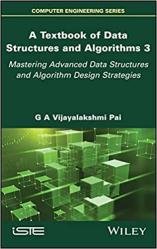A Textbook of Data Structures and Algorithms, Volume 3 : Mastering Advanced Data Structures and Algorithm Design Strategies
- Добавил: literator
- Дата: 2-02-2023, 19:29
- Комментариев: 0
 Название: A Textbook of Data Structures and Algorithms, Volume 3 : Mastering Advanced Data Structures and Algorithm Design Strategies
Название: A Textbook of Data Structures and Algorithms, Volume 3 : Mastering Advanced Data Structures and Algorithm Design StrategiesАвтор: G.A. Vijayalakshmi Pai
Издательство: Wiley-ISTE
Год: 2022
Страниц: 356
Язык: английский
Формат: pdf (true)
Размер: 10.9 MB
Data structures and algorithms is a fundamental course in Computer Science, which most undergraduate and graduate programs in computer science and other allied disciplines in science and engineering offer during the early stages of the respective programs, either as a core or as an elective course. The course enables students to have a much-needed foundation for efficient programming, leading to better problem solving in their respective disciplines.
In my decades-old experience of offering the course to graduate programs, which admits students from diverse undergraduate disciplines, with little to no strong knowledge of programming, I had several occasions to observe this malady. In fact, it is not uncommon in some academic programs, especially graduate programs which, due to their shorter duration, have a course in programming and data structures running in parallel in the same semester, much to the chagrin of the novice learner! That a novice is forced to learn data structures through their implementation (in a specific programming language), when in reality it ought to be learning augmented with the implementation of the data structures, has been the reason behind the fallout.
A solution to this problem would be to:
i) Frame the course such that the theory deals with the concepts, techniques and applications of data structures and algorithms, not taking recourse to any specific programming language, but instead settling for a pseudo-language, which clearly expounds the data structure. Additionally, supplementing the course material with illustrative problems, review questions and exercises to reinforce the students’ grasp of the concepts would help them gain useful insights while learning.
ii) Augment the theory with laboratory sessions to enable the student to implement the data structure in itself or as embedded in an application, in the language of his/her own choice or as insisted upon in the curriculum. This would enable the student who has acquired sufficient knowledge and insight into the data structures to appreciate the beauty and merits of employing the data structure by programming it themself, rather than “look” for the data structure in a prewritten code.
This means that text books catering to the fundamental understanding of the data structure concepts for use as course material in the classroom are as much needed as the books that cater to the implementation of data structures in a programming language for use in the laboratory sessions. While most books in the market conform to the latter, bringing out a book to be classroom course material and used by instructors handling a course on data structures and algorithms, comprehensive enough for the novice students to benefit from, has been the main motivation in writing this book.
Volume 3 details an assortment of data structures, algorithm design strategies and their applications. Chapters 13–15 discuss hash tables, files, k-d trees and treaps. Chapter 16 discusses the search algorithms of linear search, transpose sequential search, interpolation search, binary search, Fibonacci search, skip list search and other search techniques.
Chapter 17 elaborates on the internal sorting algorithms of bubble sort, insertion sort, selection sort, merge sort, shell sort, quick sort, heap sort, radix sort, counting sort and bucket sort, and Chapter 18 discusses the external sorting techniques of sorting with tapes, sorting with disks, polyphase merge sort and cascade merge sort. Chapters 19–21 detail the algorithm design strategies of divide and conquer, the greedy method and dynamic programming and their applications. Chapter 22 introduces the theories and concepts of NP-completeness.
Target audience:
The book could be used both as an introductory or an advanced-level textbook for undergraduate, graduate and research programs, which offer data structures and algorithms as a core course or an elective course. While the book is primarily meant to serve as a course material for use in the classroom, it could be used as a companion guide during the laboratory sessions to nurture better understanding of the theoretical concepts.
Скачать A Textbook of Data Structures and Algorithms, Volume 3 : Mastering Advanced Data Structures and Algorithm Design Strategies
Внимание
Уважаемый посетитель, Вы зашли на сайт как незарегистрированный пользователь.
Мы рекомендуем Вам зарегистрироваться либо войти на сайт под своим именем.
Уважаемый посетитель, Вы зашли на сайт как незарегистрированный пользователь.
Мы рекомендуем Вам зарегистрироваться либо войти на сайт под своим именем.
Информация
Посетители, находящиеся в группе Гости, не могут оставлять комментарии к данной публикации.
Посетители, находящиеся в группе Гости, не могут оставлять комментарии к данной публикации.
